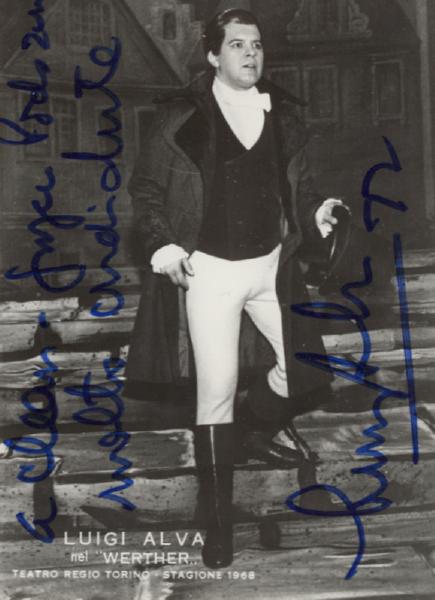Born Luis Alva Talledo, he was a marine cadet before studying voice in Lima, where he made his debuts in concert and in zarzuela
in 1949, and in opera (as Beppe) in 1951, while working for an oil company.
In 1953, he went to Italy for further studies with Emilio Ghirardini and Ettore Campogalliani. His European debut was at the
Teatro Nuovo in Milano in 1954 (as Alfredo). In 1955, he sang in the inauguration gala (Il matrimonio segreto) of the
newly constructed Piccola Scala (La Scala's smaller second stage), in 1956 on La Scala's main stage (Almaviva alongside Maria
Callas). That made him famous; in 1957, he was at the Edinburgh and Salzburg festivals (he would return to Salzburg multiple
times), from 1960 at Covent Garden, from 1961 at the Vienna Staatsoper, in Chicago and in Glyndebourne, from 1964 at the
Metropolitan Opera. He also returned to La Scala, and appeared in Monte Carlo, Hamburg, Munich, Rome, Venice, Naples, Torino,
Ciudad de México and Stockholm, at the Deutsche Oper Berlin, the Maggio musicale in Florence, the Colón in Buenos
Aires and the Moscow Bolshoj.
His specialties were Mozart, Rossini and Donizetti, but he also sang some contemporary operas.
He retired way too late: he sang opera into the 1980s, and a few years longer in concert. In one of his latest Don Pasquale
performances at the Vienna Staatsoper, he was so bad that he got absolutely no applause – but nobody booed or hissed, either.
My mother-in-law, who heard him for the first time on that evening and had not known him before, said to the lady sitting beside
her: "He is just terrible", and the lady replied: "Yes, but what do you think how good he was 20 years ago!" He used to be a big
favorite in Vienna. Francisco Araiza once told in an interview that as a very young
singer, he was cast as Almaviva at the Vienna Staatsoper. When he arrived at the theater, he found that on the playbill outside
the stage entrance, someone had crossed out his name, and substituted it by a handwritten "Luigi Alva". Araiza walked in and
asked the doorman what this was supposed to mean; the doorman looked at him: "Have you ever been booed?" – "No." –
"Today you will be." In the end, he wasn't booed, and justly took it as a confirmation that he had made it in the eyes of the
Vienna operagoers.
Reference: Kutsch & Riemens
